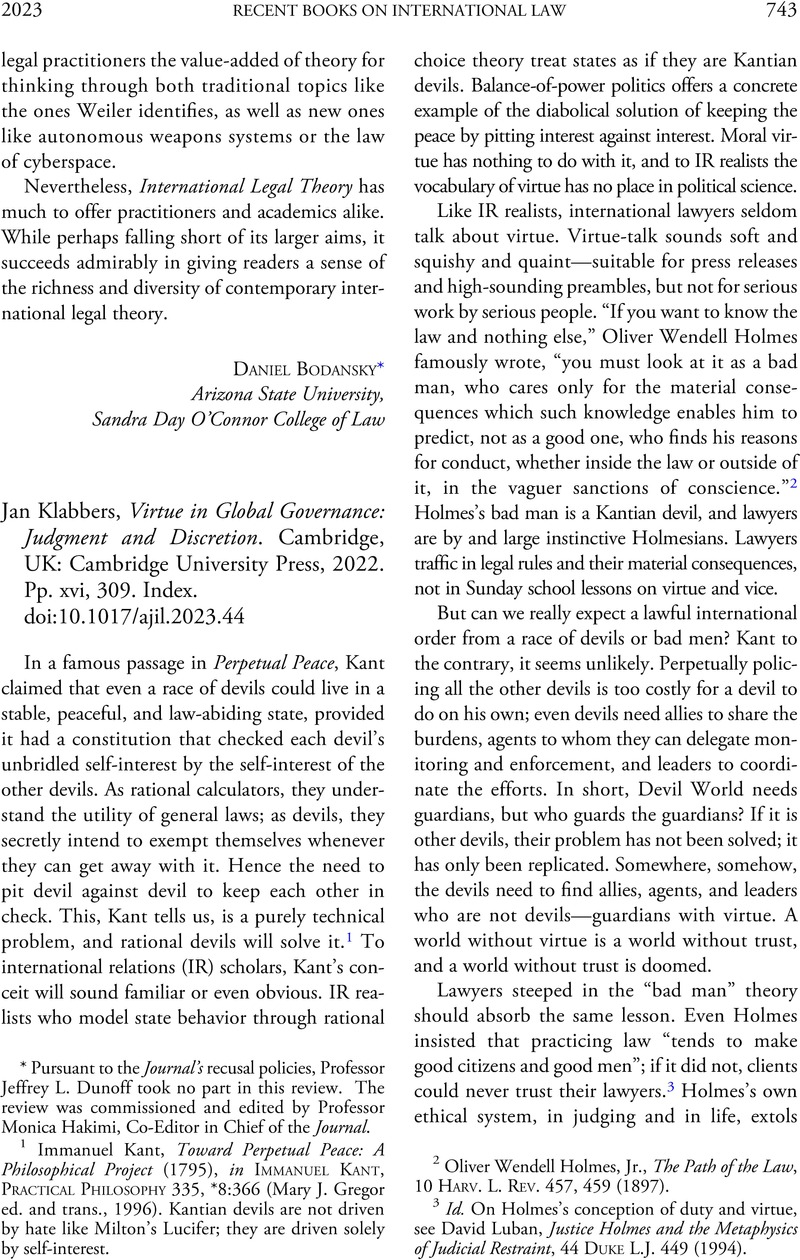No CrossRef data available.
Published online by Cambridge University Press: 30 October 2023

1 Immanuel Kant, Toward Perpetual Peace: A Philosophical Project (1795), in Immanuel Kant, Practical Philosophy 335, *8:366 (Mary J. Gregor ed. and trans., 1996). Kantian devils are not driven by hate like Milton's Lucifer; they are driven solely by self-interest.
2 Holmes, Oliver Wendell Jr., The Path of the Law, 10 Harv. L. Rev. 457, 459 (1897)Google Scholar.
3 Id. On Holmes's conception of duty and virtue, see Luban, David, Justice Holmes and the Metaphysics of Judicial Restraint, 44 Duke L.J. 449 (1994)CrossRefGoogle Scholar.
4 To avoid multiplying footnotes, I place references to Klabbers's book in textual parentheses.
5 Secretary of State Seward first proposed purchasing Greenland in 1868. U.S. Dep't. of State, A Report on the Resources of Iceland and Greenland (1868), available at https://books.google.com/books?id=U9lIAAAAMAAJ&pg=PP13#v=onepage&q&f=false. In 1946, Secretary of State Byrnes offered the Danish government $100 million for Greenland. W. Dale Nelson, Wanna Buy Greenland? The United States Once Did, Assoc. Press (May 2, 1991), at https://apnews.com/article/9d4a8021c3650800fdf6dd5903f68972.
6 Integrity in International Justice (Morten Bergsmo & Viviane E. Dittrich eds., 2020).
7 As with Klabbers's book, I cite parenthetically to Aristotle's Nicomachean Ethics, to minimize footnotes. References use the canonical citation format: book, chapter, and line number (the so-called “Bekker number” printed in the margins of all scholarly editions). Thus, “N.E. 2.6. 1106a23–24” refers to Nicomachean Ethics, Book 2, Chapter 6, lines 1106a23–1106a24. For direct quotes I use Terence Irwin's translation of the Nicomachean Ethics, Aristotle, Nicomachean Ethics (Terence Irwin trans., 2d ed. 1999).
8 Julia Annas, Intelligent Virtue (2011).
9 The example is Annas's. Julia Annas, Applying Virtue to Ethics, 32 J. Applied Phil. 1, 3 (2015).
10 This regress argument was set out explicitly by Kant. Immanuel Kant, Critique of Pure Reason A132/B171-A134/B174. However, Aristotle also recognized the regress problem: N.E. 3.3 1113a3–5. A cute modern version is known as the paradox of Achilles and the tortoise, after Lewis Carroll's famous article What the Tortoise Said to Achilles, 4 Mind 278 (1895).
11 A quibble: Klabbers writes that Kant later took Aristotle's side, “referring to Grotius and other early modern international lawyers as ‘leidige Tröster’ (‘miserable comforters’), precisely because they represented the authority of rules” (pp. 124–25). This is not correct. Kant called them miserable comforters not because of their preference for rules over virtues, but because they argued that offensive wars can be just. Kant, supra note 1, at 326, *8:355. Kant takes the phrase “miserable comforters” from the biblical Book of Job, when Job's three “friends” explain to him why he deserves his suffering (Job 16:2). Kant's point is that jurists who justify wars are miserable comforters to the thousands who lose their lives when their princes go to war. He was not taking Aristotle's side in the debate between rules and virtues; for Kant, after all, the moral law takes the form of an imperative, not a character trait.
12 Lochner v. New York, 198 U.S. 45, 76 (1905) (diss op., Holmes, J.).
13 As Aristotle notes, practical judgments are about particulars, not generalities: N.E. 6.8 1142a25, N.E. 6.11 1143a27–28.
14 Another minor quibble: in his discussion of this point, Klabbers conflates two very different concepts of discretion: the discretionary judgment required to apply broad standards like reasonableness, which is what he means to be talking about, and the discretion that comes from the non-reviewability of a supreme authority's decision (pp. 44–45). The latter is really a point about hierarchical authority, not about the logic of rule-application. Ronald Dworkin, Taking Rights Seriously 31–33 (1978).
15 Emma Daly, Dossier of NATO “Crimes” Lands in Prosecutor's Lap, Guardian (Dec. 26, 1999), at https://www.theguardian.com/world/1999/dec/26/theobserver2.
16 In this paragraph I am expressing my own views, not necessarily Klabbers's.
17 Final Report to the Prosecutor by the Committee Established to Review the NATO Bombing Campaign Against the Federal Republic of Yugoslavia, para. 5 (2000), at https://www.icty.org/sid/10052 (my emphasis).
18 Id., para. 74.
19 Id., para. 76.